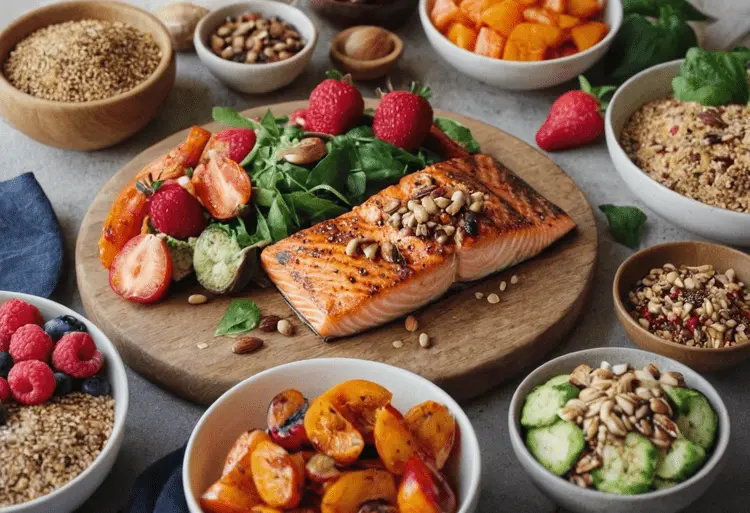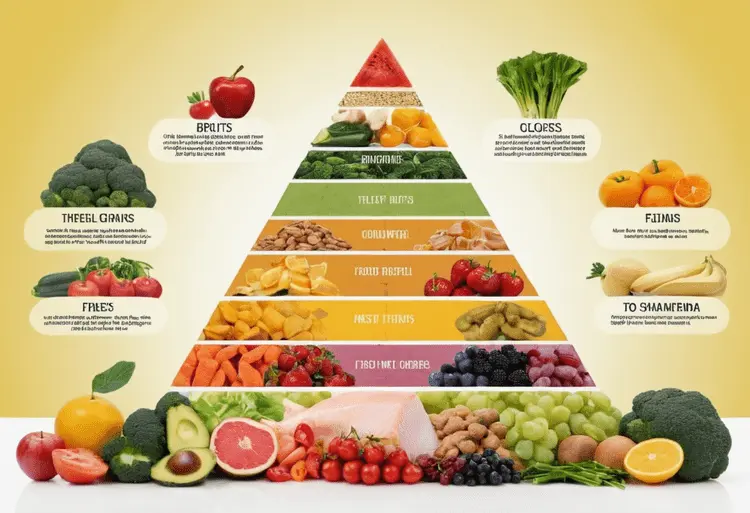An anti-inflammatory diet for IBS might be the solution you’re looking for, but it can be confusing. You have IBS, and it’s controlling your life.
The bloating, pain, and unpredictable bathroom breaks leave you feeling exhausted and restricted. You’ve tried medication, but the relief is temporary, and you’re tired of the side effects.
You’re tired of feeling restricted. You want to enjoy food again, not worry about the next flare-up. Maybe you’ve even heard about an anti-inflammatory diet for IBS, but it all seems overwhelming.
What if there was a way to manage IBS naturally? An IBS diet plan focused on foods to reduce IBS inflammation – nourishing options that actually taste good! Imagine feeling calmer, more in control, and enjoying a wider variety of meals.
This ultimate gut inflammation diet guide can help you ditch the discomfort and live symptom-free with IBS.
Anti-Inflammatory Diet for IBS: The Basics
- Ditch processed foods, go whole
- Load up on fruits & veggies
- Fish & healthy fats are key
- Identify your food triggers
- Stress & sleep matter too
- Get professional help to personalize
Table of contents
The Gut-Inflammation Connection

Introduction
Ever feel like your stomach is at war with you? Bloating, cramps, unpredictable bathroom habits – it’s no fun. If this sounds like your life, you might have IBS (Irritable Bowel Syndrome). But did you know that inflammation could be making your IBS symptoms even worse?
What is Inflammation?
Think of inflammation as your body’s alarm system. When you get injured, it kicks in to help you heal. But chronic inflammation is like an alarm that never turns off. This constant state of alert puts stress on your whole body, including your gut.
IBS and Inflammation: The Link
So, how is IBS connected to inflammation? Researchers are still working out all the details. However, they suspect that:
- Inflammation disrupts your gut lining: This can lead to leaky gut, where unwanted substances get into your bloodstream, triggering further inflammation.
- Inflammation messes with gut bacteria: Your gut needs a healthy balance of microbes, and inflammation can throw that off.
- Inflammation makes your gut hypersensitive: This means you feel pain and discomfort more intensely.
Does this mean an anti-inflammatory diet for IBS can solve all your problems? Not necessarily. But it can be a powerful tool for calming down inflammation and giving your gut a much-needed break.
Loved the anti-inflammatory guide? Get even deeper into IBS with ‘Irritable Bowel Syndrome (IBS): Your Guide to Relief.’ It’s the perfect next step to understanding your gut and finding lasting solutions.
Foundations of an Anti-Inflammatory Diet
Ready to ditch the inflammation and soothe your IBS symptoms? Let’s dive into the building blocks of an anti-inflammatory diet for IBS!
The Core Principles
Think of this diet as a celebration of whole, unprocessed foods. Picture vibrant colors, rich textures – that’s what your plate should look like! Key nutrients are your allies in this fight – omega-3 fatty acids, antioxidants, and fiber are the heroes here.
But, hold on, there are some foods that need to be sidelined, like refined carbohydrates, processed snacks, and certain types of fats.
Best Anti-Inflammatory Foods for IBS
- Fruits & Vegetables: Think low-FODMAP to be kind to your gut! Berries, leafy greens, and cruciferous veggies are your power players.
- Fish & Healthy Fats: Welcome salmon, avocados, nuts, and seeds with open arms. They’re packed with omega-3s, the inflammation-fighting superstars.
- Whole Grains: Reach for quinoa, brown rice, or oats (if you tolerate them). These offer fiber and valuable nutrients.
- Herbs & Spices: Turmeric and ginger add flavor and a powerful anti-inflammatory punch.
Is your mouth watering yet? Good! But remember, there’s more to an anti-inflammatory diet than delicious food. Let’s talk about what you might want to limit or completely avoid, especially if you have IBS.
Foods to Avoid or Limit
- Common Triggers: Think gluten, dairy, processed foods, added sugars, and some high-FODMAP culprits. These can be like throwing fuel on the inflammation fire.
- How to Identify Your Triggers: Everyone’s gut is unique. You might want to explore a personalized elimination diet with the help of a dietitian specializing in IBS. This can be a great way to pinpoint your specific sensitivities.
Let’s keep the conversation going – what foods do you find most soothing for your IBS? Have you tried any new anti-inflammatory recipes lately? Share in the comments or tag us on social media!
Beyond the Plate: Lifestyle Factors

Stress Management
Think the stress in your life doesn’t affect your gut? Think again! When you’re constantly feeling overwhelmed, your body releases stress hormones that disrupt your digestion and worsen IBS symptoms. So, how do you manage stress for a happier gut?
- De-stress Techniques: Explore relaxation practices like yoga, meditation, or deep breathing exercises. These tools help calm your nervous system and send signals to your gut that it’s okay to relax.
- Prioritize “You” Time: Pencil in some dedicated time for activities that bring you joy and peace. Whether it’s reading a good book, listening to music, or taking a walk in nature, these moments can work wonders for your mental and gut health.
Sleep Hygiene
Ever struggle with restless nights or early morning awakenings? Poor sleep quality can be a major gut disruptor. When you’re not getting enough restful sleep, your body’s ability to manage inflammation suffers, and you may experience worsening IBS symptoms.
- Set a Relaxing Routine: Establish a calming bedtime routine that helps you wind down. This could include turning off screens an hour before bed, taking a warm bath, or reading quietly.
- Optimize Your Sleep Environment: Ensure your bedroom is dark, quiet, and cool. These factors contribute to deeper, more rejuvenating sleep – and a happier gut!
Gentle Exercise
Regular moderate exercise is a fantastic way to support your gut health and manage IBS. Movement helps reduce inflammation, improve gut motility, and combat stress.
- Find What Works for You: Choose activities you enjoy, whether it’s brisk walking, swimming, dancing, or yoga. Low-impact options are especially great for those with IBS.
- Start Slowly: Don’t overdo it initially! Listen to your body and gradually increase the duration and intensity of your workouts.
Tailoring Your Anti-Inflammatory Diet
Think of your anti-inflammatory diet for IBS as a personalized journey, not a one-size-fits-all solution. What triggers one person’s IBS symptoms might be perfectly fine for another. That’s where tailoring comes in!
The Low-FODMAP Connection
Have you heard about FODMAPs? These are types of carbohydrates that can be tough for people with IBS to digest. An anti-inflammatory diet often works beautifully alongside a low-FODMAP approach.
- Consider trying a temporary elimination phase with the help of resources like the Monash University Low FODMAP Diet
- Keep a food diary to track your reactions.
- Gradually reintroduce foods to pinpoint your personal triggers.
Personalization is Key
Is there a better way to figure out what your gut needs? Yes! Elimination diets and food journaling are your secret weapons. Tracking your meals, portions, and symptoms can reveal patterns you might have missed.
Need more guidance? Partnering with a dietitian specializing in IBS can be a game-changer. They’ll create a plan that combines an anti-inflammatory diet for IBS with your unique food sensitivities.
Meal Planning Made Easy
Feeling overwhelmed by all the info? Don’t worry! Anti-inflammatory meals for IBS can be delicious and satisfying.
- Focus on whole foods: Fruits, veggies, lean proteins, healthy fats – these are your core building blocks.
- Get creative with spices: Turmeric, ginger, and others pack a flavorful anti-inflammatory punch.
- Need inspiration? There are amazing recipe resources online and cookbooks dedicated to IBS-friendly cooking.
Let me know – what are your favorite anti-inflammatory ingredients? Share in the comments or tag me on social media!
Did you know that IBS isn’t the only condition fueled by inflammation? If your anti-inflammatory diet brought relief, imagine what it could do for lipedema. Learn how to target inflammation for overall health and manage your lipedema symptoms…
Supplements: When They Can Help

Think your anti-inflammatory diet for IBS covers all the bases? Maybe, maybe not. Supplements can sometimes play a supporting role – but are they always necessary?
Supplements: Not a Magic Bullet
First things first, supplements are just that – supplements. They won’t magically cure your IBS or replace the power of a well-rounded anti-inflammatory diet. However, they can be helpful in specific situations.
When Are Supplements Worthwhile?
- Nutrient Deficiencies: An anti-inflammatory diet for IBS may lead to cutting out certain food groups. A healthcare professional can run tests to check for nutrient deficiencies. Targeted supplements may then be helpful.
- Targeted Gut Support: Looking for IBS-specific help? Consider a high-quality probiotic (ask your doctor about the best strains!) or digestive enzymes recommended by a dietician specializing in IBS. These can aid digestion and potentially reduce symptoms.
- Reducing Inflammation: Supplements like curcumin (from turmeric) or fish oil have anti-inflammatory properties. Are they the answer for everyone? Not necessarily, but they may have a place alongside your anti-inflammatory diet for IBS.
Always Talk to Your Doctor
Supplements can interact with medications or worsen certain conditions. Always discuss them with your doctor or a registered dietitian before starting anything new.
A Word of Caution
The supplement industry isn’t perfectly regulated. Look for reputable brands and opt for third-party tested products when possible.
Your Anti-Inflammatory Diet Questions Answered
Focus on an anti-inflammatory diet that’s rich in whole foods, healthy fats, and fiber. Manage stress levels as well, since stress worsens IBS.
Try these inflammation-fighting foods: berries, fatty fish like salmon, leafy greens, bone broth, and spices like turmeric and ginger.
The best anti-inflammatories for IBS are foods! Focus on fruits, vegetables, fish, whole grains, nuts, seeds, and healthy fats. Certain supplements might also be helpful – talk to your doctor.
Choose options like: berries, bananas, carrots, bell peppers, zucchini, ginger, oats, quinoa, almonds, and certain cheeses.
Yes! Reducing inflammation can significantly improve bloating, pain, and irregular bowel habits for many people with IBS.
Definitely not! An anti-inflammatory diet offers plenty of delicious and satisfying options. You’ll focus on flavorful whole foods, not restrictions.
An anti-inflammatory diet can be easy! Think simple meals like roasted veggies, salads, or quick stir-fries.
Possibly! An anti-inflammatory diet often works well alongside a low-FODMAP approach. A healthcare professional can help you personalize your plan.
Improvement can happen within a few weeks. Be patient, and remember that managing stress is also important for gut health.